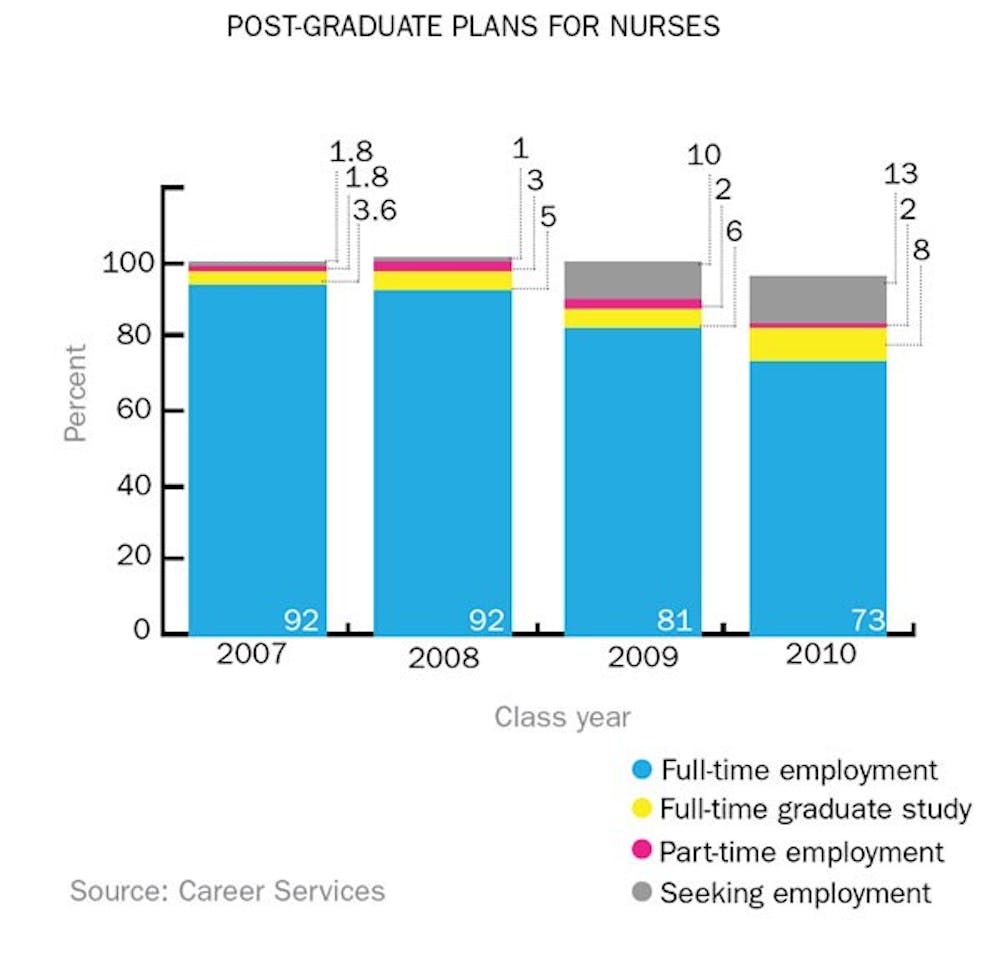Describing the current job market, “Penn nurses are not immune to the competition,” Wharton and Nursing sophomore Jeff Rollman said.
With the recent downturn of the economy, the number of Penn Nursing students with full-time jobs by graduation also went down. For the class of 2010, 73 percent reported having jobs, showing an 8-percent drop from the previous year.
According to the School of Nursing Undergraduates Career Plans Survey, students usually end up working in clinical positions, such as in hospitals and medical centers, after graduation.
However, the downward trend among Nursing graduates does not imply that there is less demand for nurses, as people do not get sick less often just because the economy is in decline, said Jeannie Cimiotti, research assistant professor of Nursing. Instead, the problem is on the supply side.
“With the economy the way it is, hospitals aren’t hiring as many nurses as they did two or three years ago,” she said.
“Many nurses didn’t retire as they expected to, and some retired ones came back to the workforce to support their families, making the market tight for some of the new grads,” she added.
Dorothy Dokko, who graduated in 2010, now works on the pediatrics floor at the Memorial Sloan-Kettering Cancer Center in New York. She was “fortunate” to be hired onto the same floor where she worked as a student, she said.
Still, Dokko agrees that experience, rather than a degree from Penn, matters more, as hospitals “seek out experienced RNs who don’t require that whole period of teaching and supervision.”
As a result, some underclassmen try to prepare and gain relevant work experience while at Penn. Rollman, for example, became a certified emergency medical technician during his senior year in high school and now works shifts for Penn’s Medical Emergency Response Team.
After graduation, Rollman hopes to work for a year or two in the “frontline” as a clinical nurse in acute care, such as in the emergency room or intensive care unit. He said that his participation in such activities will give him a “big edge.”
Finding an internship or job as a nursing student is akin to On-Campus Recruiting, he added.
As employment figures for nursing graduates dwindled, the percentage of enrollment in graduate schools increased from 3.6 percent in 2007 to 8 percent in 2010.
In fact, according to Nursing sophomore Sooin Lee, “the school encourages everyone to get a Ph.D. in nursing.”
Cimiotti explained that this is because there is a nationwide shortage in nursing educators.
“They say we’re all going to get a Ph.D.,” Lee said. “It’s just a matter of when.”
Almost 50,000 qualified applicants to professional nursing programs in the United States were turned away because there are not enough professors in nursing, Cimiotti quoted from a study by the American Association of Colleges of Nursing.
“I think Penn is in an excellent position to produce academic nurses compared to other schools,” she added.
However, despite such a known need for more nursing faculty, only 8 percent — which includes both Ph.D. candidates, nurse practitioners and other masters programs — pursue graduate study.
One reason is because in general, students apply to nursing school with the desire to become a clinical nurse rather than to enter academia. Another reason, Rollman explained, is because “you make more pay working the same number of hours and same amount of effort as a nurse than as an educator.”
Teaching “is not a lucrative job,” he added.
Eventually, such a shortage of academic nurses and faculty will result in a shortage of nurses. By the year 2020, the United States may lack as many as 200,000 physicians and 800,000 nurses, according to a Penn research study.
Such a lack will be also due to a greater demand for health services as President Barack Obama’s Patient Protection and Affordable Care Act expands coverage and access, both Rollman and Cimiotti explained.
“There is going to be a big need for more people on the provider’s end of things,” Rollman said.
Still, it seems unlikely, for now at least, that students will forgo their opportunity to practice nursing to go into academia.
“I don’t have any intentions to come back for more schooling quite yet,” Dokko said. “There is so much I am still learning on the job, and I want to be sure that I’ve built strong foundations as a bedside nurse.”



